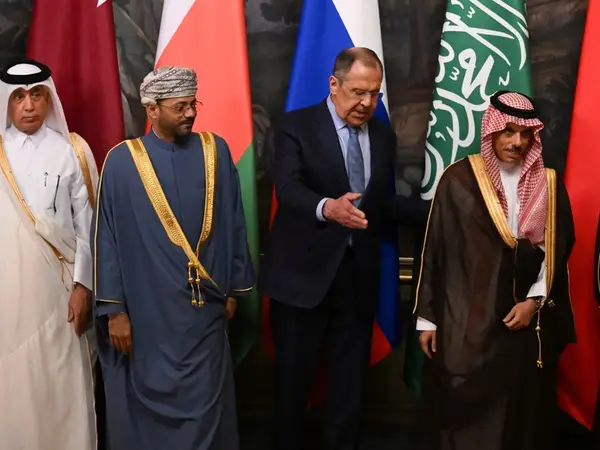Iranian media continued criticizing Russia for questioning Iran's ownership of three small islands in the Persian Gulf contested by the United Arab Emirates.
Iranian media and social media users were deeply annoyed when Russia joined the Persian Gulf Arab states earlier this week to demand a settlement to the dispute over the ownership of the islands Iran says are its integral part.
The Foreign Ministry summoned Russia's ambassador and Foreign Minister Hossein Amir Abdolahian and government spokesman Ali Bahadori wrote in separate tweets that "Iran will not compromise over its national interests and territorial integrity."
However, Tehran’s official reaction to Russia has been meek. Social media users said officials had indeed made a compromise by not naming Russia in their tweets.
Britain, which maintained control of Abu Musa, and the Greater and Lesser Tunb it had occupied in the 19th century, withdrew its forces from the Persian Gulf in 1971 and the United Arab Emirates was formed. However, Iran’s Imperial government at the time decided to reclaim what it believed were historical Iranian islands.
Mohammad Reza Shah sent the Iranian navy to secure all three in November of the same year, two days before UAE was established. Iranian forces remain on the islands, with only Abu Musa having much of a civilian population of several thousand.
In its Thursday edition, conservative newspaper Jomhouri Eslami wrote in a strongly worded editorial: "This is not going to be Russia's last treason against Iran." The daily added: "Foreign Ministry officials should not think that this episode will end by summoning Russia's ambassador. We need an essential revision of our political relations with Russia and forcing Russian statesmen to regret their treason against the Iranian nation."
The daily wrote, Russia's diplomatic move once again proved that those who opposed staunch supporters of Russia in the Iranian government were right.
The daily added that Russia and China are always prepared to undermine all international regulations and ethical rules to serve their own interests.
Asked why Moscow undermined Iran's territorial integrity," international relations analyst Mehdi Motaharnia told Khabar Online that "Russia wishes to put an end to its isolation by sacrificing Iran's interests." Meanwhile, he called Iranian officials' mild reaction "a withdrawal from revolutionary positions."
Meanwhile, Motaharinia said that "Iran's stance on the issue was one of the weakest since the 1979 revolution." He added that Russia's stance about referring the case to the International Court of Justice was tantamount to recognizing the United Arab Emirates' claims about the ownership of the three islands.
This comes, he said, while Iran has always looked at Russia as its strategic partner and has even helped Russia in its war against Ukraine, but Russia has never done anything to prove it is Tehran's strategic partner. On the contrary, he said "Russia's stance was against Iran's territorial integrity."
Also, reformist politician Elaheh Koulaei told Etemad Online website: "Russians will never consider Iran's interests in their relations with Iran or any other country." She stated that assuming Russia cares for Iran's interests is totally contradict the realities of international relations.
She echoed other public figures who have said that Iran’s pro-Moscow and pro-Beijing foreign policy has led to an imbalance, without Tehran considering geopolitical facts and Iran's geostrategic requirements. Koulaei added that Teharan’s pro-East foreign policy ignores the need for a balance between relations with East and West. Such a policy cannot serve Iran's national interests.
Meanwhile, former lawmaker Ali Motahari wrote in a tweet: "Russia understands that Iran has been isolated because of its radical anti-Western policies and it needs Russia's support."
Motahari added: "Russia's behavior was in fact another warning to Iran and its pro-Russian politicians to stop their pro-Eastern policies and revert to the idea of "neither East nor West" that was its foreign policy motto after the 1979 revolution."
